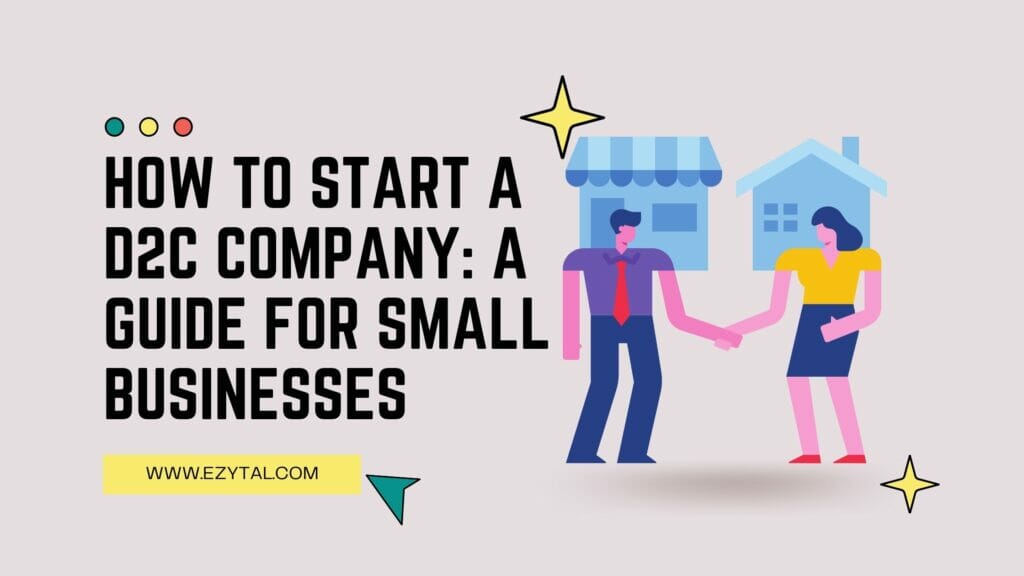How to start a D2C company: a guide for small business
Direct to customer (D2C) business models have become increasingly popular for small businesses in recent years. This business model allows businesses to skip the middleman and sell products and services directly to consumers. There are a number of advantages to using a direct-to-customer business model, including lower costs, increased customer loyalty, and better customer feedback. If you are considering using a direct-to-customer business model for your small business, there are a few things you need to keep in mind. First, you need to develop a strategy for marketing and selling your products and services directly to consumers. You also need to create a system for handling customer orders and payments. And finally, you need to ensure that you are providing excellent customer service to ensure that customers are happy with their purchases. If you are ready to start selling products and services directly to consumers, there are a number of resources available to help you get started. Here are a few tips to help get you started with D2C: 1. Choose the right eCommerce platform: There are a lot of different e-commerce platforms out there, so it’s important to choose the right one for your business. Shopify is a popular platform that is easy to use and has a lot of features, we at ezytal can support you with Shopify. Book an appointment with our technical support team here. We also recommend EzyWeb our in-house product which is not only easy to set up your online store but also easy to drag and drop website builder. It is your creativity that is only required to keep your brand unique and appealing. Do it yourself e-commerce builder can help you to do it yourself without requiring any external agency to manage and build your website. Now, coming to the other important aspect of Direct to customer (D2C) business models let’s jump to point no. 2. 2. Create a compelling brand: Your brand is key to success in the D2C market. Make sure you create a brand that is unique and resonates with your target audience. 3. Offer a great customer experience: The customer experience is key when selling products direct to consumers. Make sure you offer a great experience that will make your customers want to come back and buy from you again. Great customer service and fast delivery times are a good place to start. 4. Optimise your site for Google and conversion: It’s important to get top rankings in Google for your target keywords. You will also need to figure out how to drive high-conversion rates on your site in order to increase sales. To do this, you should use paid advertising, such as Google Ads, and implement good landing pages and SEO best practices. 5. Create social media profiles: You’ll need to set up social media profiles for your business. If you don’t have much experience with social media, you should plan to spend some time maintaining these profiles on a regular basis. 6. Promote on niche job boards: You can find freelance employees by promoting your startup on niche job boards. This is an excellent way to build your team and scale your business. 7. Sell your products at trade shows and events: If you can afford to do so, travelling around to trade shows and other events with your D2C business can be very worthwhile. Not only will you be able to sell your products, but you may also be able to network and grow your brand. 8. Use event-based in-market messaging: Implement in-market messaging that is event-based rather than time-based. For example, you could offer discount codes when someone clicks on an event link so they can save money when they buy your product. 9. Experiment and iterate: You need to be willing to experiment and iterate if you want to succeed with direct to consumer sales. This means you may need to try out a few marketing tactics before you see results. Be patient and keep testing new ideas! 10. Use a D2C business forecasting model: You’ll need to build and maintain a business forecast model in order to manage your growth. This will help you understand your cash flow, which is especially important for D2C businesses that are selling physical products. What are the risks and challenges of a D2C business? As a small business, running a D2C company has its share of risks and challenges. But you can overcome these obstacles and succeed if you’re willing to put in the work! 1. Lack of funding or capital: One of the biggest risks for small businesses is a lack of funding or capital. However, you can likely overcome this risk with hard work and self-promotion. Eventually, your D2C business may be able to receive funding or be sold for a large sum of money. 2. Marketing challenges: Marketing your new D2C business will be a huge challenge right from the start. You’ll need to be self-trained or hire a professional marketer to help you spread the word about your company. This 10K bucks in marketing can help you get started. 3. Lack of skills and experience: Of course, starting a D2C business of any kind is a huge risk. You probably don’t have the same skills and experience as someone who has been working in the industry for decades. But that’s ok! You can learn how to be a successful entrepreneur simply by playing to your strengths and relentlessly promoting yourself and your company. How to overcome the challenges of starting a D2C small business Despite the risks and challenges, you can be hugely successful as a small business owner — if you’re willing to work hard. The usual rules apply: Work as hard as you possibly can, sacrifice when you need to and be patient as you build your company. 1. Give yourself an advantage: Whatever industry you choose to market directly to consumers, try to give yourself as much of an advantage as possible. You can do this by investing
How to start a D2C company: a guide for small business Read More »

